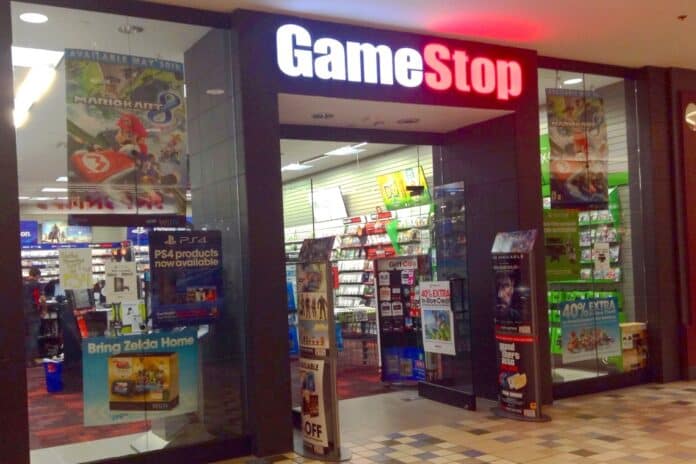With a surprising move, GameStop announced the closure of its NFT marketplace on February 2nd, citing persistent regulatory uncertainties in the Web3 crypto space.
The gaming giant, which had already removed support for its NFT wallet in November for similar reasons, is following the trend of large companies distancing themselves from NFTs.
The decision comes after last week the social media platform X discontinued the NFT profile picture feature.
Summary
The context of GameStop in the NFT and Web3 world
GameStop’s entry into the NFT arena began in May 2021, at a strategic moment, shortly after a retail-driven market squeeze inflated the value of the struggling stock.
The marketplace was officially launched in July 2022, quickly securing a place among the top ten platforms with an impressive trading volume of $6 million in the first two months.
However, recent data indicates a sharp decline, with a volume of only about $40,000 recorded in the last month.
Despite the initial enthusiasm, GameStop’s aspirations for NFTs have not materialized as expected.
As part of its previous attempts with NFT, the company received a substantial grant from the Immutable-2 gaming layer, which established a $100 million NFT gaming fund.
However, GameStop has chosen to sell a significant portion of its tokens from this agreement. The company has also been integrated with the layer-2 Loopring.
It is interesting to note that, while 2023 has seen a decline for NFTs, Blockworks has reported that the gaming sector remains a promising area for utility-focused NFTs.
However, the recent decision by GameStop indicates a different perspective, as the company seems to be moving away from the NFT landscape.
In this context, the gaming platform Nifty Island, based in Austin, has taken a bold step by releasing the beta version of its open-world game.
The game introduces a new concept where users inhabit islands and play as 3D renderings of their NFT avatars.
This move aligns with the broader trend of the Web3 space, which aims to bring utility to NFTs by allowing holders to seamlessly integrate their collectibles into the metaverse.
The new philosophy of Nifty Island in the metaverse
Despite GameStop’s exit from the NFT market, the broader Web3 ecosystem continues to witness innovations aimed at merging virtual experiences with blockchain technology. The closure of GameStop’s NFT market raises questions about the regulatory obstacles that still loom over the industry.
The company’s decision to exit the sector indicates that, for some, the regulatory environment remains a formidable challenge.
The bold move by Nifty Island in the open-world gaming arena aligns with the growing sentiment that service-focused NFTs can be a key factor for adoption.
The ability to seamlessly transport NFT avatars in a metaverse environment represents a forward-thinking approach that seeks to redefine how users interact with their digital assets. This paradigm shift is not limited to the gaming industry, but reflects a broader trend in the Web3 space.
The metaverse, once a buzzword that captured the imagination of cryptography enthusiasts, is experiencing a resurgence of interest. The support of Warner Bros.
Discovery to a metaverse project in the style of Ready Player One suggests that major operators still see the potential of creating immersive virtual worlds.
The concept of the metaverse, which had somewhat fallen out of use, is now gaining renewed attention as companies explore ways to integrate NFTs and blockchain technology into interactive digital spaces.
Nifty Island, pioneer of a new era of NFT integration in games, joins a growing list of projects seeking to bridge the gap between the digital and physical world.
The vision of users expressing themselves through their virtual identities, just as they would in the real world, indicates a profound transformation in the way we perceive and interact with digital resources.
Conclusions: the Web3 and NFT space continues its evolution despite GameStop’s exit from the market
Although GameStop’s exit from the NFT market may be seen as a setback, it is essential to recognize that the Web3 space is dynamic and constantly evolving. Companies are continuously adapting their strategies to address regulatory uncertainties and market trends.
The recent decline in NFT activity during 2023 could be a temporary phase, and the gaming sector’s ability to recover, highlighted by Blockworks, suggests that service-focused NFTs could be a catalyst for renewed interest.
In conclusion, the closure of GameStop’s NFT market reminds us of the challenges that companies must face in the unpredictable landscape of the cryptocurrency space.
When one door closes, another one opens, and the adventure of Nifty Island in the realm of Web3 games exemplifies the industry’s determination to explore new frontiers.
The metaverse, once again in the spotlight, promises to reshape the way we engage with digital assets, bringing us closer to the vision of a perfectly integrated virtual and physical world.
As we navigate through these uncharted territories, the intersection between gaming, NFTs, and the metaverse continues to be a fascinating space to observe.




